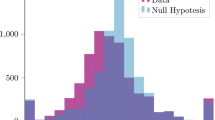Abstract
Some social networks, such as LinkedIn and ResearchGate, allow user endorsements for specific skills. From the number and quality of the endorsements received, an authority score can be assigned to each profile. In Pérez-Rosés et al (Proceedings of INNOV 2015: the fourth international conference on communications, computation, networks and technologies, Barcelona, pp. 68–73. http://www.thinkmind.org/index.php?view=instance&instance=INNOV+2015, 2015; Comput Commun 73:200–210. http://dx.doi.org/10.1016/j.comcom.2015.08.018, 2016), an authority score computation method was proposed, which takes into account the relations existing among different skills. The method described in Pérez-Rosés et al (Proceedings of INNOV 2015: the fourth international conference on communications, computation, networks and technologies, Barcelona, pp 68–73. http://www.thinkmind.org/index.php?view=instance&instance=INNOV+2015, 2015; Comput Commun 73:200–210. http://dx.doi.org/10.1016/j.comcom.2015.08.018, 2016) is based on enriching the digraph of endorsements corresponding to a specific skill, and then applying a ranking method suitable for weighted digraphs, such as PageRank. In this paper we take the method of Pérez-Rosés et al (Proceedings of INNOV 2015: the fourth international conference on communications, computation, networks and technologies, Barcelona, pp 68–73. http://www.thinkmind.org/index.php?view=instance&instance=INNOV+2015, 2015; Comput Commun 73:200–210. http://dx.doi.org/10.1016/j.comcom.2015.08.018, 2016) to the limit, by successive application of the enrichment step, and we study the mathematical properties of the endorsement digraphs resulting from that process. In particular, we prove that the endorsements converge to some values between 0 and 1, and they reach the value 1 only in some specific circumstances. This allows the use of the limit values as input to the ranking algorithm.








Similar content being viewed by others
Notes
Not to be confused with Euler’s totient function.
References
Berkhin P (2005) A survey on pagerank computing. Internet Math 2(1):73–120
Chartrand G, Lesniak L (2004) Graphs and digraphs, 4th edn. CRC Press, Boca Raton
Meyer CD (2001) Matrix analysis and applied linear algebra. SIAM, Philadelphia (2001)
Page L, Brin S, Motwani R, Winograd T (1998) The pagerank citation ranking: bringing order to the web. Technical report, Stanford InfoLab
Pérez-Rosés H, Sebé F (2015) Synthetic generation of social network data with endorsements. J Simul 9(4):279–286. doi:10.1057/jos.2014.29
Pérez-Rosés H, Sebé F, Ribó JM (2015) Endorsement deduction and ranking in social networks. In: Proceedings of INNOV 2015: the fourth international conference on communications, computation, networks and technologies, Barcelona, Spain, Nov. 15–17, pp 68–73. http://www.thinkmind.org/index.php?view=instance&instance=INNOV+2015
Pérez-Rosés H, Sebé F, Ribó JM (2016) Endorsement deduction and ranking in social networks. Comput Commun 73:200–210. http://dx.doi.org/10.1016/j.comcom.2015.08.018
Weisstein EW (2016) q-Pochhammer symbol. In: From mathworld—a wolfram web resource. Accessed 4 February 2016. http://mathworld.wolfram.com/q-PochhammerSymbol.html
Xing W, Ghorbani A (2004) Weighted PageRank algorithm. In: Proceedings of the 2nd annual IEEE conference on communication networks and services research, pp 305–314
Zhang X, Yu H, Zhang C, Liu X (2007) An improved weighted Hits algorithm based on similarity and popularity. In: Proceedings of the 2nd IEEE international multisymposium on computer and computational sciences, pp 477–480
Acknowledgments
The authors acknowledge partial support by the Spanish Government under Project MTM 2013-46949-P, and by the Government of Catalonia, under Grant 2014SGR-1666.
Author information
Authors and Affiliations
Corresponding author
Rights and permissions
About this article
Cite this article
Pérez-Rosés, H., Sebé, F. Iterated endorsement deduction and ranking. Computing 99, 431–446 (2017). https://doi.org/10.1007/s00607-016-0511-z
Received:
Accepted:
Published:
Issue Date:
DOI: https://doi.org/10.1007/s00607-016-0511-z




